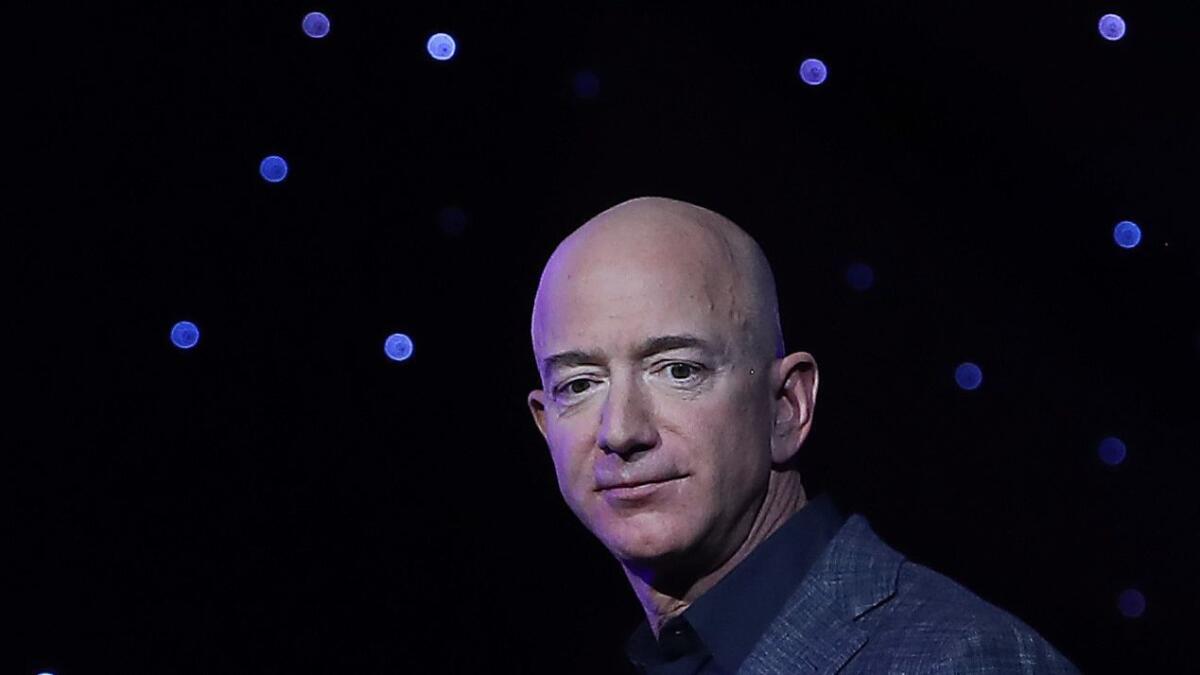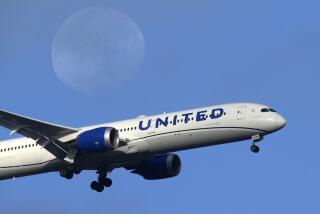Chasing SpaceX, Amazon seeks permission to launch 3,236 internet satellites

- Share via
Amazon.com Inc. asked for U.S. permission to launch 3,236 communications satellites, joining a new space race to offer internet service from low orbits and challenge the fleet planned by Elon Musk’s SpaceX.
Amazon in a July 4 filing told the Federal Communications Commission that its Kuiper satellites would deliver broadband to tens of millions of consumers and businesses that now lack adequate access to the internet. The agency coordinates trajectories and radio-frequency use.
The FCC already has approved nearly 13,000 low-Earth orbit satellites. Those include 11,943 for Musk’s Space Exploration Technologies Corp., which launched an initial batch of 60 spacecraft in May.
SpaceX faces daunting challenges if it’s going to win the internet space race »
Besides SpaceX and Amazon, possible space-broadband providers include London-based OneWeb, which is backed by Japan’s SoftBank Group Corp. and British billionaire Richard Branson’s Virgin Group, and LeoSat Enterprises, a Washington, D.C., company that has partnered with major European satellite maker Thales Alenia Space. Satellite manufacturer Boeing Co. has also submitted paperwork to the FCC proposing its own satellite broadband constellation.
At low-Earth orbit — altitudes of 112 to 1,200 miles (or about 180 to 2,000 kilometers) — satellites need to race around the globe to stay aloft, completing orbits in as little as 90 minutes. As one moves toward the horizon, it will hand off signal duties to the next satellite coming by. Many satellites are needed if continuous, widespread coverage is the goal.
Amazon in its FCC application said its satellites would operate at altitudes of about 370 to 390 miles (590 to 630 kilometers).
Amazon Chief Executive Jeff Bezos last month said the Kuiper project would cost “multiple billions of dollars.” The project is separate from Bezos’ space launch vehicle maker, Blue Origin.
“This is a long-term project that envisions serving tens of millions of people who lack basic access to broadband internet,” Amazon said in a statement in April, when the company’s satellite program first became public in a filing with the International Telecommunications Union.
Here’s why your internet may be delivered by a drone someday soon »
In its FCC filing, Amazon said it would help serve U.S. communities “by offering fixed broadband communications services to rural and hard-to-reach areas.” The Kuiper System will help mobile network operators to expand wireless services, Amazon said in its application. It also offered the prospect of “high-throughput mobile broadband connectivity services for aircraft, maritime vessels and land vehicles.”
SpaceX has similar ambitions. The company has said its broadband coverage would be aimed at customers in the U.S. and around the world, “including areas underserved or currently unserved by existing networks.” In mid-June, Musk seemed to narrow the scope, saying the broadband plan’s main value was in providing internet access to “rural or semirural areas, places that don’t have connectivity right now.”
In 2017, more than 26% of people who lived in rural areas in the U.S. were not covered by terrestrial broadband internet service, according to a May report from the Federal Communications Commission; 33 million Americans don’t have access to speedy mobile service. Worldwide, 3.8 billion people remain without fast and reliable broadband service, according to Amazon’s application; industry experts have estimated that only 10% to 20% of the Earth’s land area is covered by terrestrial cell towers.
Times staff writer Samantha Masunaga contributed to this report.
More to Read
Inside the business of entertainment
The Wide Shot brings you news, analysis and insights on everything from streaming wars to production — and what it all means for the future.
You may occasionally receive promotional content from the Los Angeles Times.










